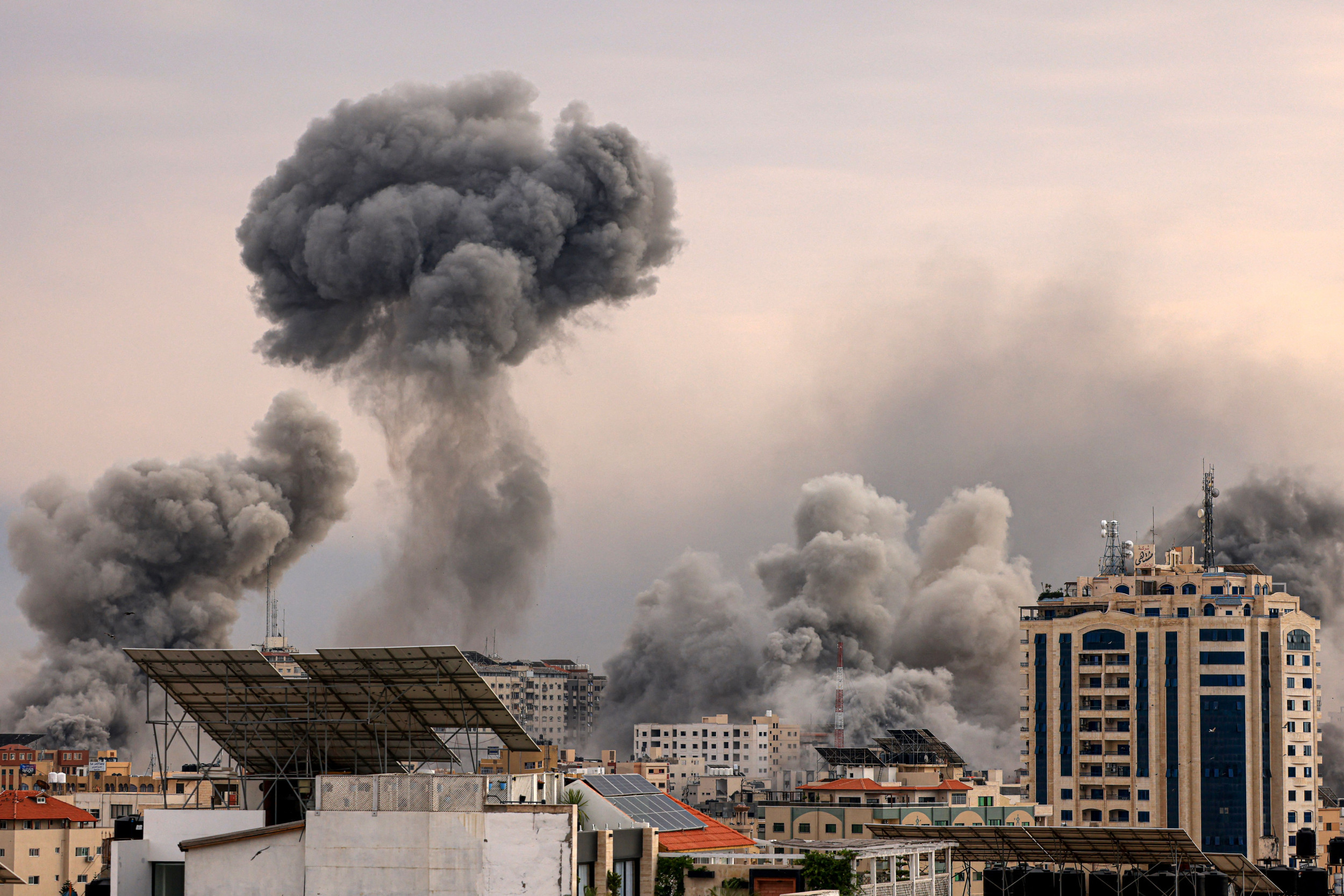Israeli aircraft and artillery are undertaking an intense bombardment of the Palestinian Gaza Strip, following this weekend’s surprise Hamas infiltration attack. It is expected to be the first stage of a major military operation into the blockaded coastal enclave in a bid to destroy the Islamist militant group.
A Palestinian humanitarian worker told Newsweek on Monday that the situation in the impoverished 140 square-mile territory had already badly deteriorated under intensifying strikes and warned that a humanitarian crisis appears inevitable as Israeli Defense Minister Yoav Gallant vowed to put the area under a complete siege.
Around 500 Palestinians have been killed by Israeli airstrikes in Gaza as of early Monday, according to the Palestinian Health Ministry, with another 2,750 people wounded. Newsweek has not been able as yet to verify these and other figures. The bombardment follows Hamas’ rocket and infiltration attack this weekend, in which at least 800 people have been killed and more than 2,500 injured.
The Palestinian death toll is expected to soar amid the ongoing Israeli air campaign and with the launch of the expected ground incursion. Israel Defense Forces (IDF) could be seen preparing for this around Gaza’s borders as of Monday morning.
Israel has mobilized around 300,000 reservists, with Prime Minister Benjamin Netanyahu declaring the Israelis are now at war. Their death toll, too, is still rising up as their forces secure the southern area infiltrated by Hamas units.
Imminent ‘Crisis’
Nebal Farsakh, a spokesperson for the Palestinian Red Crescent Society, told Newsweek that humanitarian teams are already struggling to handle the deluge of killed and wounded from the opening stages of the Israeli campaign.
“We are witnessing a significant increase in attacks on towers, residential buildings, mosques, and homes in Gaza,” Farsakh said. “This has resulted in a large number of casualties,” she added, noting that “some residential buildings were reportedly struck without even warning for residents to be evacuated.”
Israel has, at times, warned Gazan residents of an impending airstrike using SMS messages or the so-called “roof knocking” technique, in which an inert munition is dropped on a target building to warn those nearby to flee. The target is then destroyed sometime after using explosive munitions.
Farsakh said PRCS teams had handled 172 fatalities and 683 wounded since the start of the latest campaign. More than 120,000 Gazans—of a total population of around 2 million—have been internally displaced, she added.
The casualties, Farsakh said, include PRCS workers. “Israel is also targeting medical facilities and staff conducting their humanitarian role,” she said. “We have recorded around five different violations against medical missions in Gaza. This has led to the injuries of five PRCS [personnel], one of them suffered critical injuries.”
“The humanitarian situation has really degraded,” Farsakh said. “If the escalation is going to be continued, absolutely we’re heading towards a humanitarian crisis.”
“Absolutely it is one of the worst times that the PRCS teams in Gaza have dealt with,” Farsakh said. “The number of airstrikes is intensifying. We are witnessing a significant increase in attacks on residential buildings and homes of civilians. It is very difficult for us to work under such circumstances, and our capacity simply doesn’t cover our needs. We are talking about hundreds of fatalities as well as thousands of injuries.”
A ground offensive, Farsakh added, will “absolutely make it worse. The situation already in Gaza is really, really difficult. The humanitarian situation is degraded.”
Gaza Under Siege
Israel shows no sign of easing its increasing pressure on Gaza, which, since 2007, has been under blockade by Israel and Egypt. Hamas seized control of the territory that year after a brief conflict with Fatah, which dominates the Palestinian Authority that nominally governs the occupied Palestinian West Bank.
This weekend’s massacre in southern Israel appears to be a turning point in the simmering confrontation between Hamas and Israel, which has periodically ignited into short-lived but intense conflicts. The surprise operation humiliated the Israeli government and horrified its foreign backers. The brutality and scale of the Hamas attack has set the tone for what is expected to be a devastating Israeli response.
Netanyahu told Israelis this weekend that the military “will act immediately to destroy Hamas’s capabilities.” He added: “We will cripple them mercilessly and avenge this black day they have brought upon Israel and its citizens.”
The Israeli Air Force said Monday it was “launching an extensive attack on many centers of the terrorist organization Hamas in the Gaza Strip.” Newsweek has contacted the IDF by email to request comment.
Gallant made clear Israeli intentions in Gaza. “I have ordered a complete siege on the Gaza Strip,” the defense minister said. “There will be no electricity, no food, no fuel, everything is closed.” He added: “We are fighting human animals and we are acting accordingly.” Gaza’s water, too, has been cut off by order of Israeli Energy Minister Israel Katz.
The humanitarian situation in the coastal Hamas stronghold has long been deteriorating, with the enclave having been under air, sea and land blockade—which Israel says is needed to stop weapons smuggling—for 15 years.
Unemployment has reached 45 percent, and there are few prospects for the territory’s young people, who report soaring levels of mental health problems. Medical supplies and fuel are sparse, while food insecurity—already a significant problem—has been exacerbated by Russia’s war on Ukraine.
“Operation Swords of Iron,” then, comes against a bleak backdrop. Gaza’s enclave’s stretched infrastructure is already in dire straits.
“Electric supply is only available for four hours during the day,” Farsakh said. “The electricity cuts are affecting hospitals that now rely on backup generators. Some hospitals only have enough fuel to last for four days.
“We’re heading towards a humanitarian crisis if the escalation will continue,” Farsakh added. “That’s why we call international organizations to pressure Israel to open a humanitarian corridor to allow the entry of medical supplies and the humanitarian aid.”

